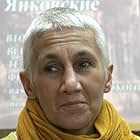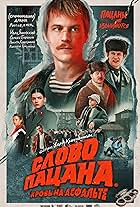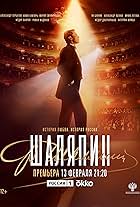The series is based on Guzel Yakhina´s excellent novel of the same title (recommended reading). The action begins in 1930, with Soviet soldiers coming to a tartar village as part of the campaign to repress and deport relatively prosperous peasants who opposed collectivisation.
Zuleikha is a young tartar peasant who lives with her husband and her very demanding and recriminating mother in law. She puts up with quite some rough treatment from both without ever complaining. She gets up first, goes to bed last, she believes in ghosts, and her four daughters have died in infancy. One day her life is completely changed when her husband opposes Soviet soldiers and is killed. She is then deported by train to Siberia on a journey that takes several months during which many of her fellow deportees die of hunger or disease.
Much of the series goes into showing the struggle for survival of 30 deportees of all walks of life who are abandoned in the middle of nowhere in the taiga. Zuleikha´s capacity to endure proves invaluable in her new life, in a new place, in a new culture. It allows her to open her eyes and grow in a world full of hardship, despite the hardship.
The series is beautifully filmed, with a lot of care, the views are breath-taking. The acting is very good from all the main characters (Evgeni Morozov, Yuliya Peresild, Roman Madyanov, etc.) and from most secondary characters. Chulpan Khamatova, who plays Zuleikha, shows again what a great actress she is, particularly in the second half of the series.
Very few films or series stand comparison to the novels that inspired them, and this is no exception. I wish more attention had been given to Zuleikha´s life before deportation, which is one of the most remarkable parts of the novel. In the series it is very much compressed, dealt with quite summarily, in just one of the eight episodes.
This series has given rise to a lot of passion and criticism among many in Russia when shown in early 2020. To an outsider with some knowledge of Russian culture and history, such a reaction is difficult to understand, because cultural, political and military developments are shown with a considerable degree of neutrality and restraint.
With the caveat that I would have given Zuleikha´s pre-deportation world more room in the series (an extra episode?), I find this to be a good adaptation of the novel, definitely worth watching.
























